Israelis Think US Administration Has Greater Influence on Israel's Security Decisions Than Israeli Government
The largest share of respondents think that the United States has the greater influence on security decisions relating to Israel—almost double the share of those who think that the reins of security are in the hands of the Israeli government. The majority of Israelis think that Israel’s security is one of US President Trump’s central considerations.
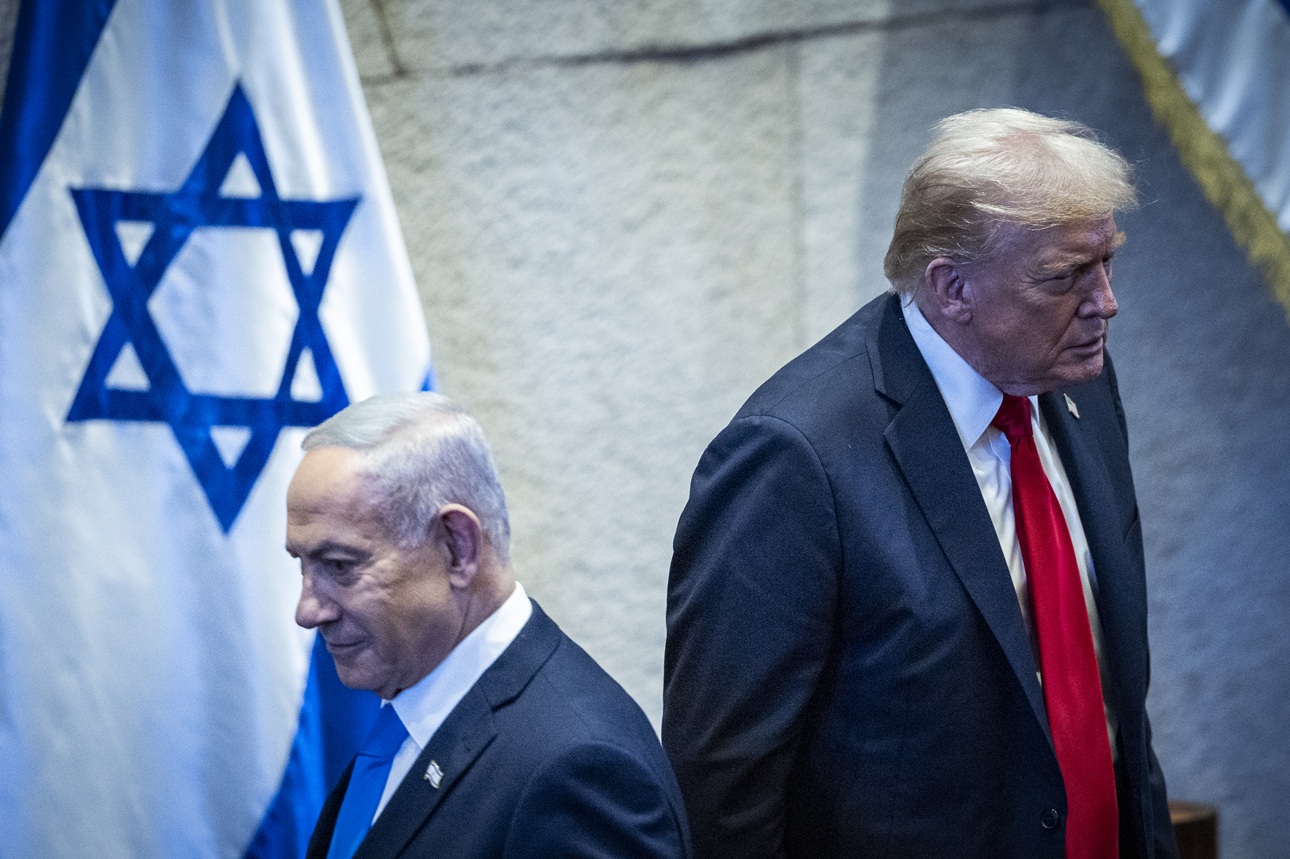
Photo by Yonatan Sindel/Flash90
Methodology
The survey was conducted by the Viterbi Family Center for Public Opinion and Policy Research at the Israel Democracy Institute between November 2–6, 2025. It was based on a representative sample of the population in Israel aged 18 and above, comprising 604 Jewish interviewees and 152 Arab interviewees.
- Presumably influenced by the signing of the ceasefire agreement and the release of the hostages, there was a slight increase this month in the total sample in the proportion of those optimistic about the future of Israel’s national security (by 7 percentage points) and the future of the Israeli economy (by 5 percentage points). A slight increase (2 percentage points) was also measured in the rate of optimism about the future of social cohesion. By contrast, there was a slight decline (down 1 percentage point) in optimism about the future of democracy, apparently due to the renewal of steps to advance the judicial overhaul.
Optimistic about the future of democratic rule, national security, the economy, and social cohesion (total sample; %)
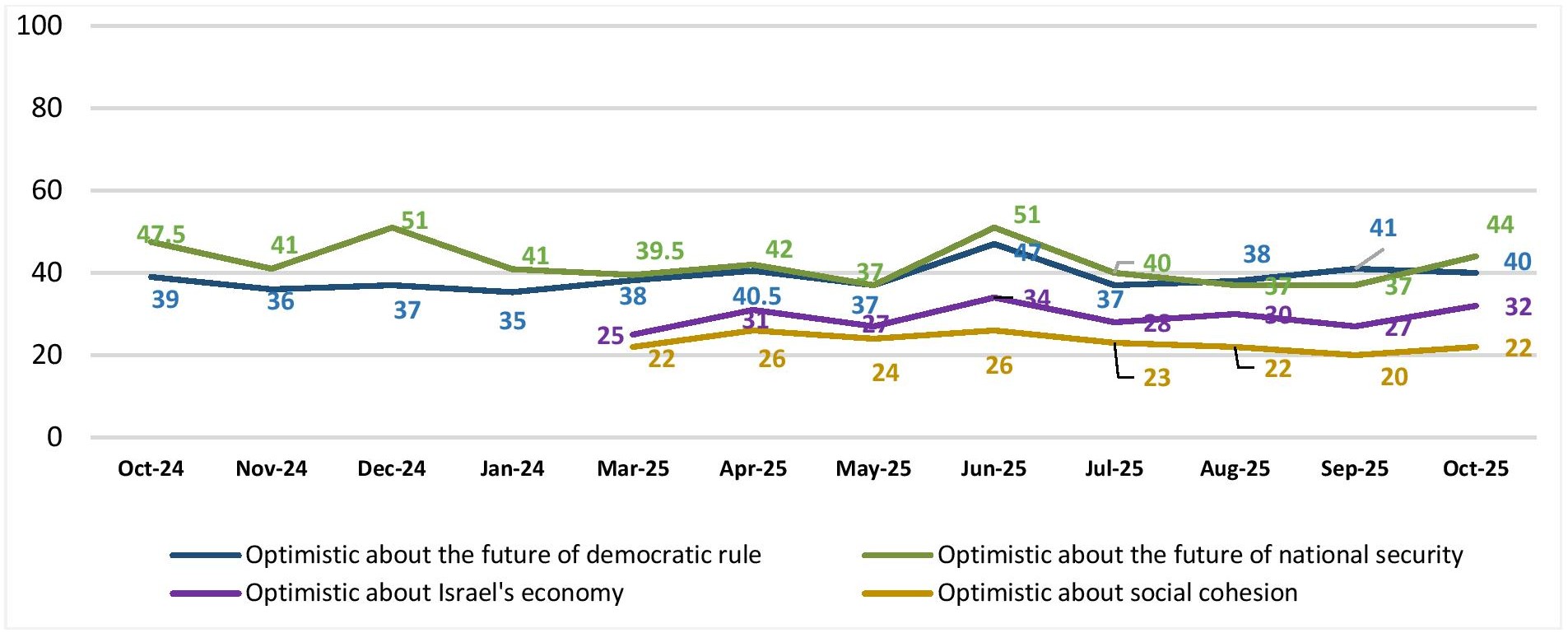
- Regarding the future of democracy, security, and the economy, optimism among Jews is stronger than among Arabs (respectively: future of democracy—Jews, 41%, Arabs, 33%; future of national security—Jews 49.5%, Arabs 14.5%; future of the economy—Jews 35%, Arabs 16%). Regarding social cohesion, though they constitute a minority in both groups, the share of optimistic Arabs is slightly larger than that of Jews (24% vs. 21%).
- Breaking down the findings by political orientation (Jews) reveals that only a minority on the Left and in the Center are optimistic about all four of these areas (only around a third or less). On the Right, on the other hand, there is a solid majority of optimists about the future of national security and a small majority of optimists about the future of democratic rule. The rate of optimism in this camp about the future of the economy is close to half. Here, too, only around a quarter are optimistic about the future of social cohesion.
Optimistic about the future (Jews, by political orientation; %)
| Future of national security | Future of democratic rule | Future of the economy | Future of social cohesion | |
| Left | 23 | 17 | 11 | 8 |
| Center | 34 | 22 | 20 | 18 |
| Right | 63 | 54.5 | 47 | 26 |
In August 2025, Prime Minister Netanyahu laid out five principles for ending the war. We asked to what extent each of these principles has been realized or not realized so far.
- The return of all the hostages (living and dead) is the only principle that a majority of the general public believe has been realized to a fairly large or very large extent (72%).
- By contrast, with regard to the other four principles, a large majority of the public believe that so far they have been realized only to a small extent or not at all: Israeli security control of Gaza, 64%; demilitarization of the Gaza Strip, 69%; disarming Hamas, 74%; and a civilian administration that is neither Hamas nor the Palestinian Authority, 74%.
To what extent has each of these principles for ending the war been realized or not realized so far? (total sample; %)
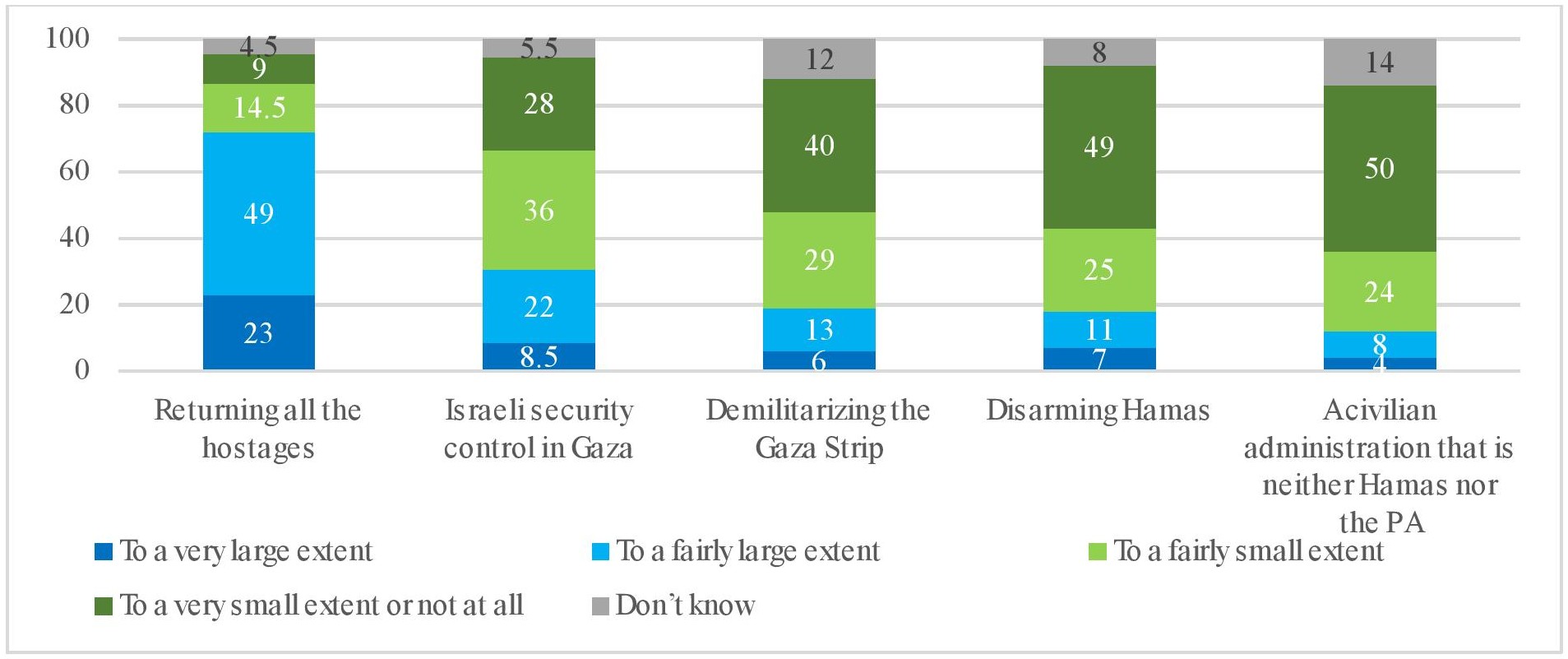
- There were significant differences between Jews and Arabs as to whether two principles have been implemented to a fairly or very large extent: returning all the hostages—Jews 76%, Arabs 56%; Israeli security control in Gaza—Jews 28.5%, Arabs 41%. Regarding the other principles, the differences between Jews and Arabs are negligible.
- In the Jewish sample, a much larger proportion of those on the Right than of those in the Center and on the Left say that the principles for ending the war have been realized. This difference is consistent across all five principles.
Think that each of the principles for ending the war has been realized to a fairly large or very large extent (Jews; %)
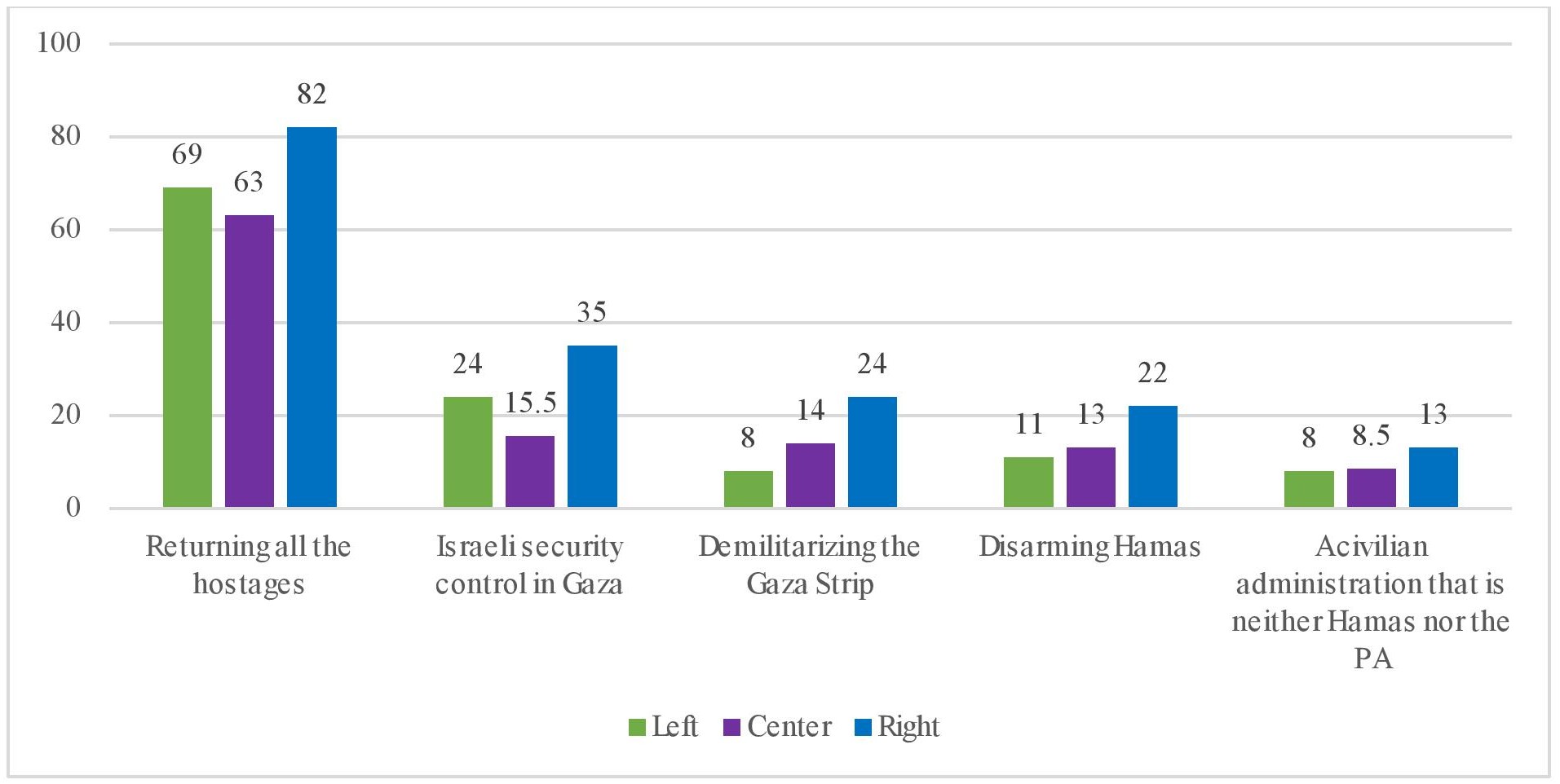
- In the total sample, 35% support the annexation of the West Bank/Judea and Samaria to the State of Israel, 33% support reaching a diplomatic agreement with the Palestinians, and 18% support leaving things as they are now.
- Not surprisingly, we found significant differences between Jews and Arabs: A solid majority of Arabs support reaching a diplomatic agreement with the Palestinians, while a quarter prefer to leave the situation as it is. Among Jews, the largest share, though not the majority, support annexing these territories to the State of Israel, and another quarter prefer reaching an agreement.
What do you think is the most preferable option regarding the future of the West Bank/Judea and Samaria? (%)
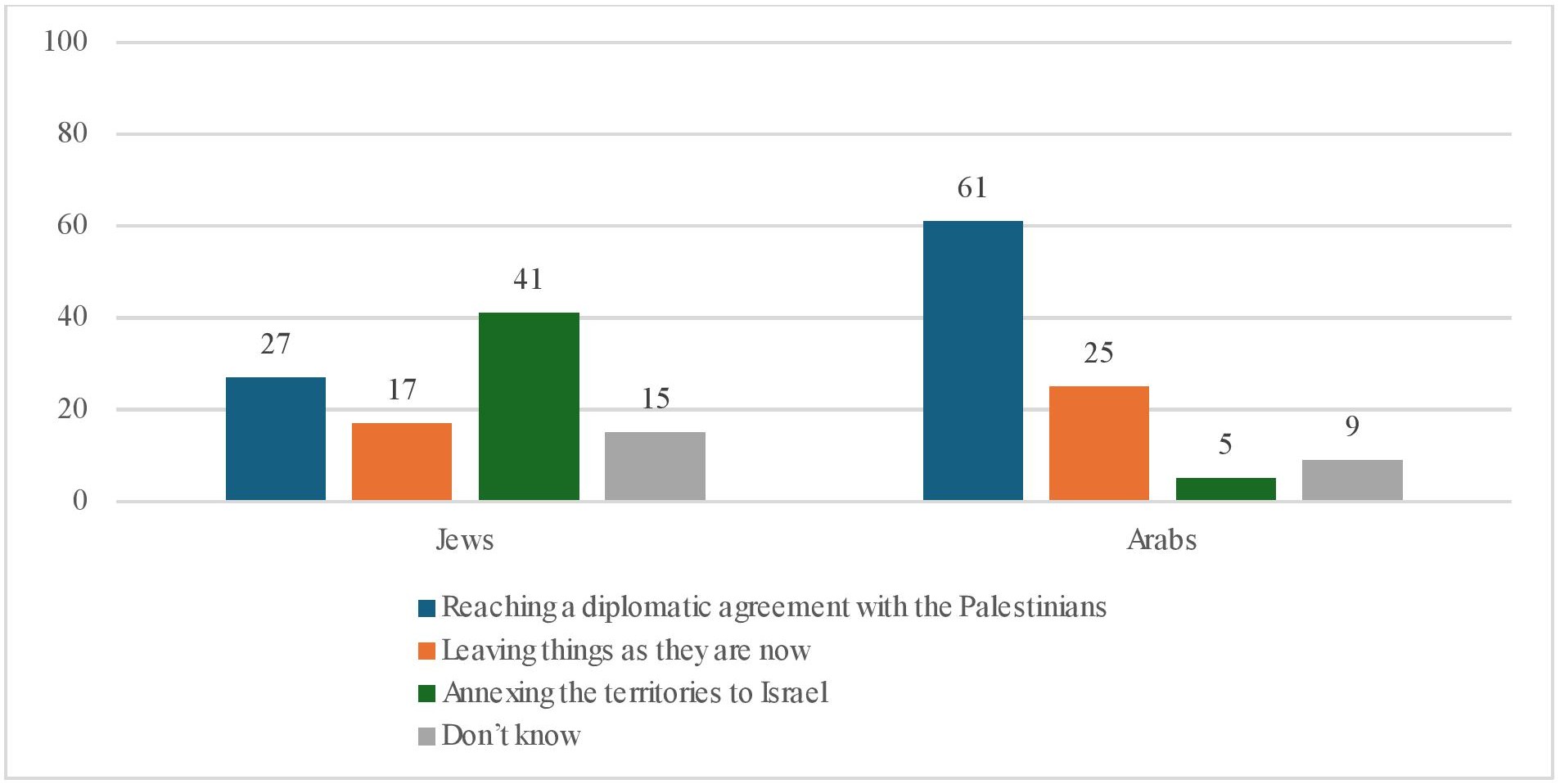
- A large majority on the Left (Jews) view reaching a diplomatic agreement with the Palestinians as the preferred option. Similarly, the largest share of respondents in the Center support reaching an agreement, although they are not a majority, and their proportion is significantly lower than the corresponding share on the Left. On the Right, the picture is reversed: the majority support annexation to the State of Israel.
| Jews (%) | Left | Center | Right |
| Reaching a diplomatic agreement with the Palestinians | 71.5 | 39 | 13 |
| Leaving things as they are now | 12 | 24.5 | 14 |
| Annexing the territories to Israel | 7 | 19 | 58 |
| Don’t know | 9.5 | 17.5 | 15 |
| Total | 100 | 100 | 100 |
- Almost half the Jewish respondents (49.5%) support the conscription of all young Haredi men, with the exception of a small number of outstanding yeshiva students, and another 31% support drafting all young Haredi men who are not engaged in Torah study and are enrolled at “dropout yeshivot.” Only 15% prefer to maintain the current situation, whereby a minority of Haredi men enlist voluntarily.
- These findings are very similar to those from September 2025, when the war was still ongoing. In other words, the end of the war has not altered the attitudes of the Jewish public regarding Haredi conscription.
- Among Arabs, the relatively large share of those who support keeping the situation as it is (35%) is highly notable, and this position may stem from the concern that any change in the conscription policy may increase demand for the Arab population to play its part too. Smaller shares support the conscription of all Haredim except for outstanding yeshiva students (26%) or of young Haredim who are not engaged in Torah study (23%).
- Breaking down the Jewish sample by religiosity reveals that a large majority of all groups, with the exception of the Haredim, support changing the status quo. Among secular and traditional non-religious respondents, the majority support drafting all young Haredi men with the exception of outstanding students, while in the national religious and traditional religious groups the preference is to draft those Haredim who are not studying Torah and are enrolled at “dropout yeshivot.” Among Haredim, around three-quarters support maintaining the status quo.
Given that even after the agreement to end the war, there is still a need for a very large number of soldiers, what do you think is the most appropriate solution to the issue of drafting Haredim to the IDF? (Jews; %)
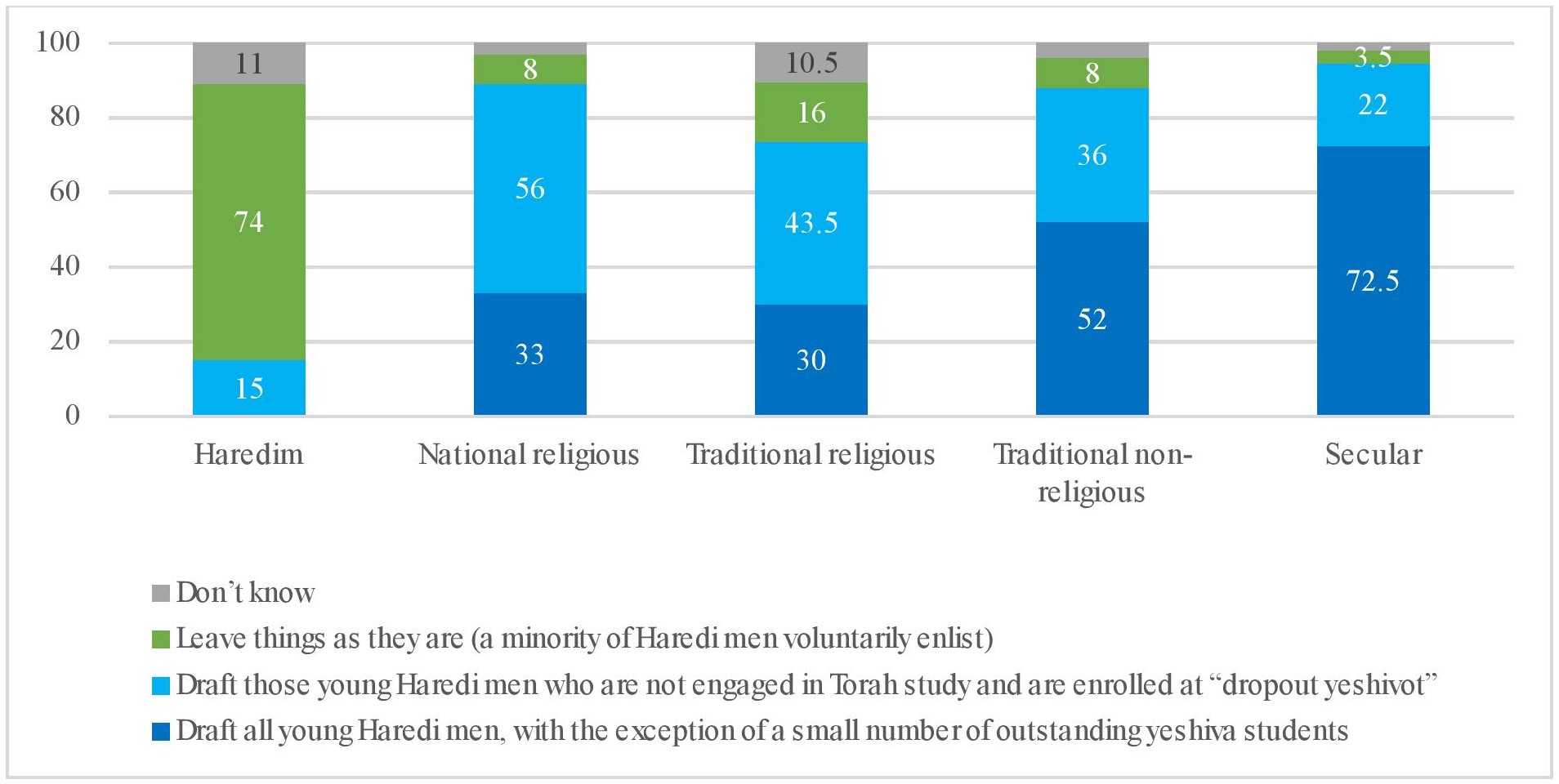
- Approximately half of the respondents in the total sample (51%) think that it is not correct to advance the judicial overhaul laws given the current situation in Israel, while 33% take the opposite view. A larger proportion of Arabs than of Jews oppose the advancement of judicial overhaul legislation, though this proportion is significantly lower than found in the previous measurement.
- A comparison with the findings from December 2024 (total sample) shows that the share of those who support advancing the judicial overhaul has remained stable, but there has been a decline of 10 percentage points in the proportion of those who oppose it. This decline has been accompanied by a significant increase in the proportion of respondents selecting the “don’t know” option.
Against the background of the current situation, in your opinion, is it correct or not correct at this time to advance the judicial overhaul initiated by Justice Minister Yariv Levin? (%)
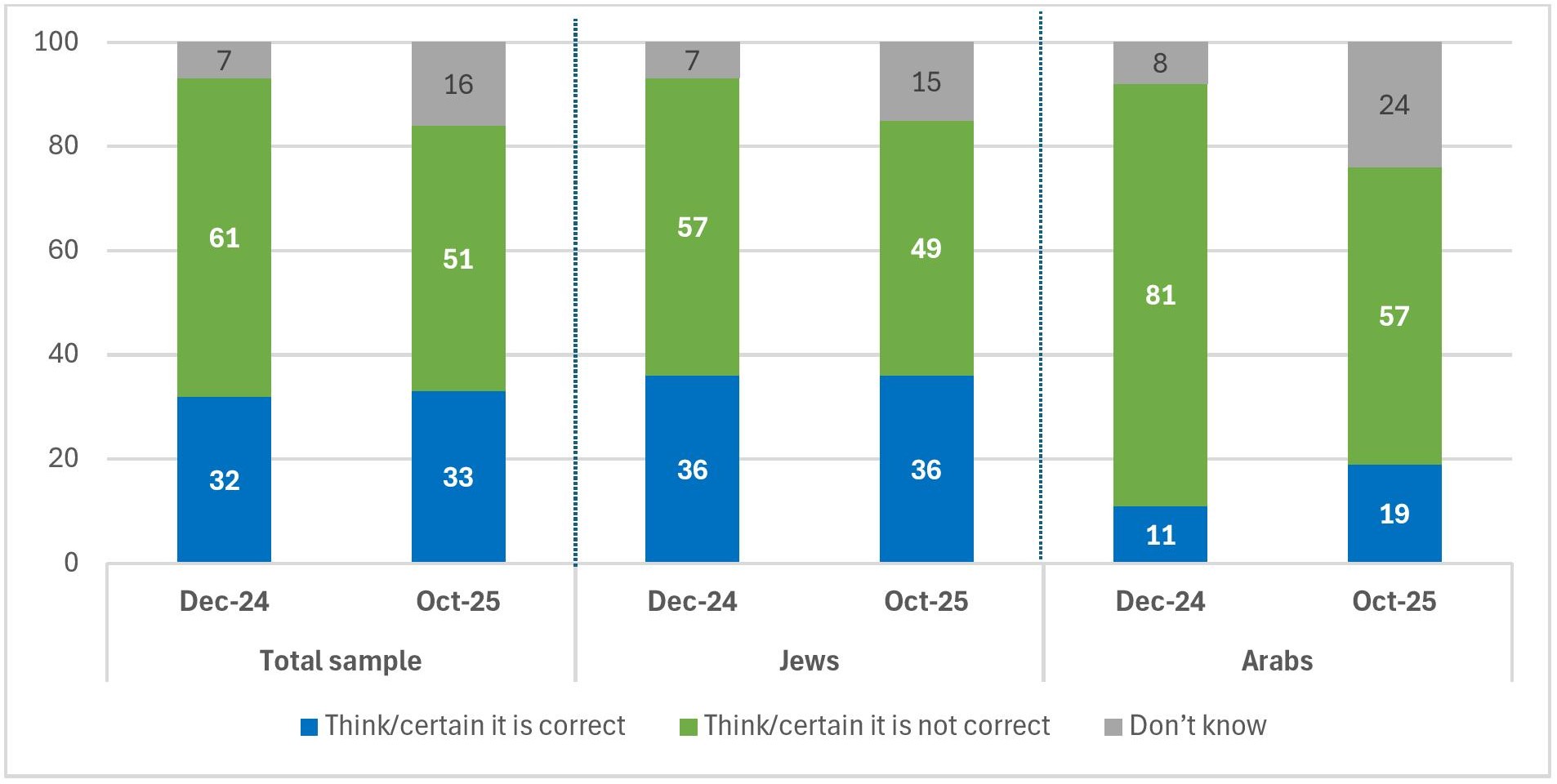
- In the Jewish sample, among those in the Center, and to an even greater extent on the Left, a large majority oppose advancing the judicial overhaul at the current time (67.5% and 87%, respectively). On the Right, the picture is reversed: the largest share (49.5%) support advancing the overhaul, while 34% oppose it.
- The majority of Israelis, Jews and Arabs alike, think that Israel’s security is one of US President Trump’s central considerations. Among Jews, there has even been a slight increase relative to June of this year. Among Arabs, the share who take this view is larger than the corresponding share among Jews.
Think that Israel’s security is one of President Trump’s central considerations (%)
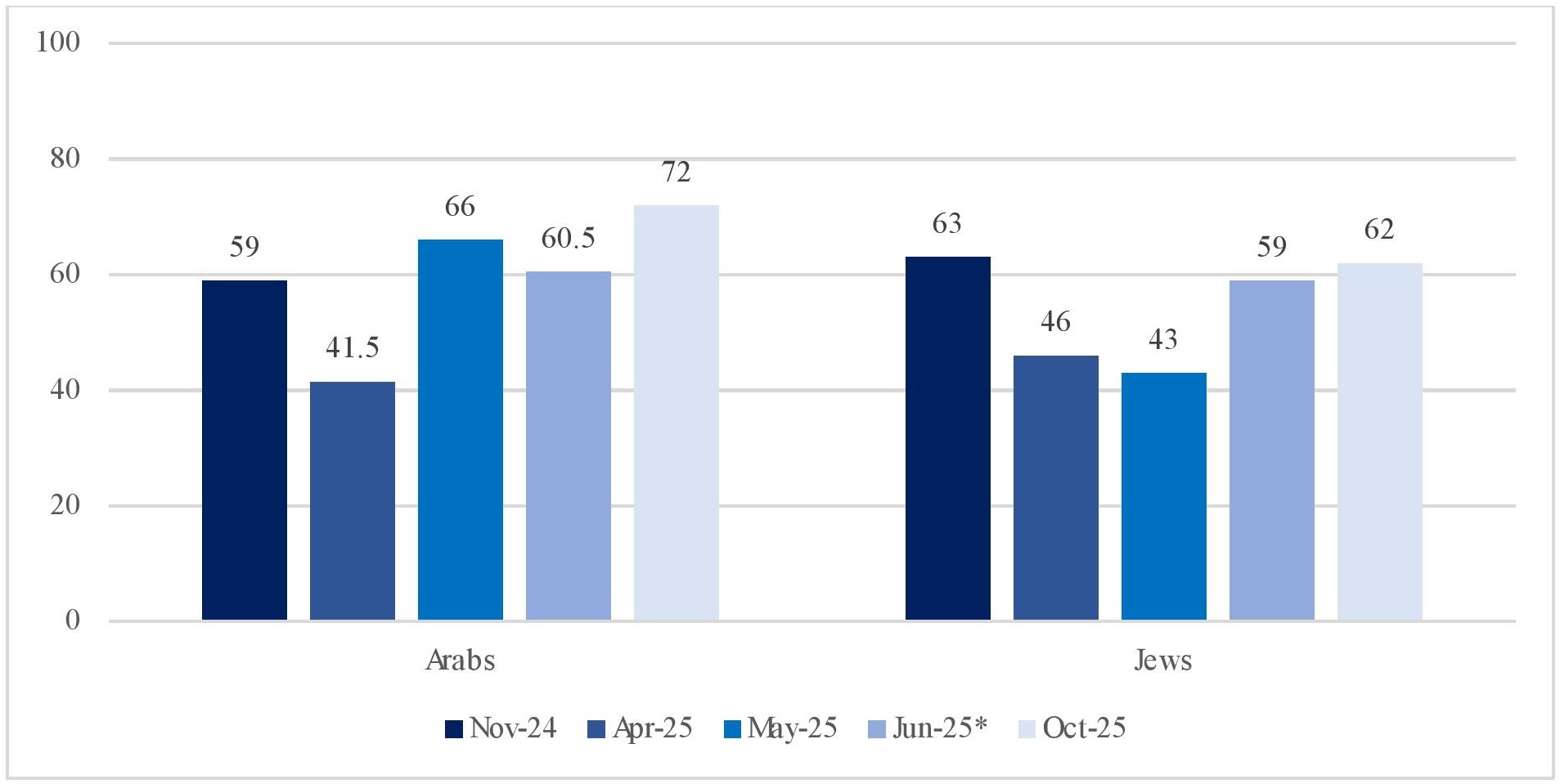
- There are large differences between the political camps (Jews), though in all three the prevailing perception is that this issue is important to Trump: On the Left, around one-half (49%) think that Israel’s security is a central consideration for the US president, as do 58% of those in the Center, and more than two-thirds of those on the Right (67.5%).
- Who has the most influence on shaping Israel’s security policy? The most surprising finding of this survey is that in the total sample, the largest share of respondents think that the United States has the greater influence on security decisions relating to Israel—double the share of those who think that the reins of security are in the hands of the Israeli government.
Which has greater influence on security decisions relating to Israel? (%)

- Breaking down responses in the Jewish sample by political orientation reveals that in all three camps, the largest share—and on the Left and in the Center, the majority—think that the US administration is the main decision-maker regarding Israel’s security.
| Jews (%) | Left | Center | Right |
| Government of Israel | 14 | 17 | 30 |
| US administration | 64 | 54 | 37.5 |
| Both equally | 17 | 26 | 28 |
| Don’t know | 5 | 3 | 4.5 |
| Total | 100 | 100 | 100 |
The October 2025 Israeli Voice Index was prepared by the Viterbi Family Center for Public Opinion and Policy Research at the Israel Democracy Institute. The survey was conducted via the internet and by telephone (to include groups that are under-represented on the internet) between November 2–6, 2025, with 604 men and women interviewed in Hebrew and 152 in Arabic, constituting a nationally representative sample of the adult population in Israel aged 18 and over. The maximum sampling error was ±3.56% at a confidence level of 95%. Field work was carried out by Shiluv I2R. The full data file can be found at: https://dataisrael.idi.org.il.
